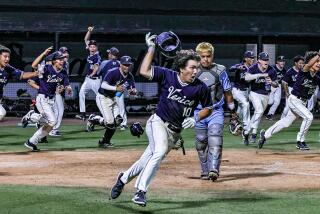POP MUSIC REVIEW : Venice, the Band, Simmered Pleasantly but Never Boiled Up in San Juan
- Share via
SAN JUAN CAPISTRANO — Venice, the beach town, won its renown as a hub of free-form bohemianism.
Venice, the band hailing from the beach town, could have benefited from a bit of that anything-goes spirit Friday night at the Coach House. Built around two sets of brothers (who are, beyond that, each other’s cousins), the seven-man band showed unmistakable ability throughout its 90-minute show. But Venice’s tendency to play things safe musically kept the concert from rising very often above pleasant proficiency.
The band’s influences are strictly mainstream. The Doobie Brothers and Crosby, Stills & Nash figure strongly in the vocal harmonies; Bryan Adams’ style of meaty-chord, big-beat rock was a reference point on some of the stormier numbers. Lead singers Kipp and Mark Lennon both drew upon soul influences--Kipp taking a huskier, grittier approach while Mark sang with a clarity of tone that alternately recalled David Crosby and Mickey Thomas.
(To clarify family matters, Kipp and rhythm guitarist Patrick form one set of Lennon brothers, while Mark and lead guitarist Pat compose the other. All four are kin to the Lennon Sisters, the middle-of-the-road pop act from the ‘50s and ‘60s).
Venice’s conservatism was evident in its reluctance, or inability, to take its considerable vocal and instrumental resources on uncharted excursions. All 12 songs from its debut album, “Venice,” were offered up in copy-the-record fashion. That’s fine for a display of technique, but it doesn’t allow a live show to breathe and spring to life.
Through most of the show, there was a sense of firepower being held in reserve. Keyboards player Monroe Jones provided tasty Hammond organ accompaniments at every turn, but he never got to step into the spotlight. The two guitarists played some tandem bits but never pushed or challenged each other. With two strong lead singers, Venice has a rare asset--one that should have been expended more thoroughly in vocal duels and trade-offs that might have enabled the show to reach a boil. Instead, it simmered along, with tasteful and well-coordinated but too-calculated playing and singing.
Aside from some Bono-style heroic pose-striking by Kipp Lennon, Venice didn’t do much to project a personality. Song introductions, mostly by Kipp Lennon, tended to be halting. Also, the ever-earnest Venice would have done well to show a lighter side.
Some of those earnest songs were well worth hearing, though. The show opener, “All My Life,” raised a promise that the rest of the set didn’t really deliver. Kipp Lennon bristled with energy, leaping with abandon as the stormy, philosophic number gathered intensity. The song also featured some tandem soul vocalizing by the two front men, and whipped up a spirit reminiscent of those more roots-oriented Irish ravers, Hothouse Flowers. But Venice seldom scaled that sort of peak again.
Venice also was adept in more delicate modes. “Hideaway Hill” was a well-executed harmony piece that seemed modeled after the CS&N;/Jefferson Airplane classic, “Wooden Ships.” In fact, this wistful song about escaping to a peaceful haven could serve as a thematic sequel to the apocalyptic “Wooden Ships.”
Venice further showed that it is important to be earnest at least some of the time. The band played several topical songs, all of them well-wrought and emotionally expressive.
“People Laugh” was especially praiseworthy. The ballad featured some of Venice’s sharpest lyric-writing as it juxtaposed vivid, aching scenes of a man dying from AIDS against verses depicting a boorish comedian trading on the AIDS disaster to get laughs in a smoky club. “Is it really so easy to kick a man that’s down/’Cause he don’t live his life like you do?” the song asks.
It’s commendable that Venice, at least obliquely, has decided to take on barking jackals such as Sam Kinison and Andrew Dice Clay. Still, a band with more of an edge might have had the gumption to name names--which Venice doesn’t do--and to disrupt the song’s plaintive surface with some more bitter, seething emotion.
Plaintiveness worked well for Venice on “Ocean,” an environmental song of exceptional tenderness. The song personifies the polluted sea as a wronged and abandoned lover waiting to have its negligent partner--the human race--restore love and harmony to the relationship.
Songs such as these established that Venice is not only skilled, but often thoughtful. But it’s going to have to take more risks to produce memorable live shows.
The opening band was Sacred Haze, a young group from San Clemente that sounded like a neo-Moby Grape as it dug deep into ‘60s folk-rock and psychedelic influences. Lead vocals straight out of the Neil Young quaver-and-break method were annoyingly off the mark at times. But they gathered presence and control at others, and never lost conviction.
However, the lyrical concepts were hazy indeed, as the band sang about eternity and life and death and important stuff such as that without putting much flesh on its grand notions.
At least Sacred Haze knew enough to set aside the philosophizing after a while and just get down to blasting its way toward fuzztone guitar heaven. While Sacred Haze overdid the period-piece revivalism, the band managed to avoid sounding mannered and fussy about it.
More to Read
The biggest entertainment stories
Get our big stories about Hollywood, film, television, music, arts, culture and more right in your inbox as soon as they publish.
You may occasionally receive promotional content from the Los Angeles Times.











